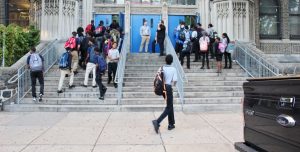The Citizen Updates: Empathy, Gerrymandering and a Principal's Letter
The Citizen Updates: Empathy, Gerrymandering and a Primary Writes to Police force
Following upwardly on some of 2016'southward most talked-virtually stories
Dec. twenty, 2016
Ideas We Should Steal: Teaching Empathy in Schools
In Denmark, students learn empathy the manner they acquire math, in school. Non coincidentally, the Danes are the happiest people on globe
By Roxanne Patel Shepelavy

" Equally Jessica Alexander and Iben Sandahl describe in their new volume, The Danish Way of Parenting: What the Happiest People in the World Know About Raising Confident, Capable Kids , Danish students spend part of every week following a deliberate curriculum to help them hone their social skills and become more than generous, compassionate and socially-conscious people.
The programs kickoff in kindergarten, with children being shown pictures that express different emotions. They identify them, talk about what the pictured kid might be feeling, and how they might help that child—teaching them how to read people's faces equally a mode to understand what they're feeling. Every bit they get older, the curriculum ages with them. In some middle schools, Alexander and Sandahl draw, students have weekly problem-solving sessions, addressing arguments they're having with each other, or problems they have at home, or situations they see at schoolhouse, like bullying or cliques. They all focus on the aforementioned things: Listening to each other, working through problems as a group, and learning from other people'due south experiences.
![]() Perhaps most importantly, they learn, from a young historic period, that being connected socially—and empathetically—to other people is equally important every bit securing a high course on their exams. They deport this with them across the school walls, into machismo and their communities. Information technology's like counteractive programming: Yes, survival requires selfishness; but living takes something much harder—generosity."
Perhaps most importantly, they learn, from a young historic period, that being connected socially—and empathetically—to other people is equally important every bit securing a high course on their exams. They deport this with them across the school walls, into machismo and their communities. Information technology's like counteractive programming: Yes, survival requires selfishness; but living takes something much harder—generosity."
UPDATE: Presently after we ran this article in August urging American schools to teach empathy, the way they exercise in Denmark, we learned near Christa Tinari of Peace Praxis , whose company b rings research-based social emotional learning (SEL) programs into schools around the country. In the fall, she launched a public lecture series on teaching empathy in children, bringing the lessons out of the classrooms directly to parents.

YOUR Metropolis DEFINED:GERRYMANDERING
How to disenfranchise voters the American way
By Stephen St.Vincent
 "'Gerrymandering' is when districts are redrawn deliberately to give an electoral advantage to i party over the other. The goal of the gerrymanderer is to draw districts that are skewed in favor of his or her ain party.
"'Gerrymandering' is when districts are redrawn deliberately to give an electoral advantage to i party over the other. The goal of the gerrymanderer is to draw districts that are skewed in favor of his or her ain party.
Pennsylvania is a nifty (ok, terrible) example of gerrymandering. In 2014 , in that location were about four 1000000 registered Democrats and about 3 one thousand thousand registered Republicans. You would expect, then, that Democrats would have a majority in the state House of Representatives. If all held according to averages, the state House should have something like 116 Democrats and 87 Republicans. But, thanks to gerrymandering, information technology's practically flipped, with merely 84 Democrats and 119 Republicans .
![]() Fortunately, there is a better way. Algorithmic redistricting focuses on a 2d rule in add-on to 'one person, one vote': compactness. Compactness basically measures how ridiculous a district looks. The closer a district is to looking similar a circle, the more compact information technology is, and therefore the less probable it is to exist biased. The less it looks like a circumvolve, the more we should be wary of gerrymandering. Non every commune can look like a circle, only no commune should wait like a salamander. The merely data used by algorithmic redistricting are population and location; there's literally no other information, so that the results can't exist biased past annihilation."
Fortunately, there is a better way. Algorithmic redistricting focuses on a 2d rule in add-on to 'one person, one vote': compactness. Compactness basically measures how ridiculous a district looks. The closer a district is to looking similar a circle, the more compact information technology is, and therefore the less probable it is to exist biased. The less it looks like a circumvolve, the more we should be wary of gerrymandering. Non every commune can look like a circle, only no commune should wait like a salamander. The merely data used by algorithmic redistricting are population and location; there's literally no other information, so that the results can't exist biased past annihilation."
UPDATE: Since this story ran last February, there has really been some news in the world of gerrymandering. For a problem that's and then pervasive, gerrymandered districts are rarely overturned past courts. But in Dec, a console of federal district court judges overturned Wisconsin's state legislative districts, which were fatigued in 2011. They plant that the maps, fatigued past Republicans, unduly discriminated against Democrats.
This was but the second fourth dimension in U.S. history, and the first time in 30 years, that a federal court overturned a legislative redistricting scheme every bit unconstitutional due to gerrymandering. The Constitution Center made a podcast about the case, which you can listen to here , for all of the legal implications of the court's ruling. The instance, naturally, will be appealed to the Supreme Court, pregnant that information technology probable won't be settled until late 2022 at the earliest.
In Pennsylvania, the big news related to gerrymandering was really the passage of the constitutional subpoena to raise the mandatory judicial retirement age from seventy to 75. Past increasing the retirement historic period, two Democrats (and only one Republican) will be permitted to stay on the court through any challenge to the redistricting plan following the 2022 Census. In other words, the change probable ensures a Democratic majority on the court when, as is expected, Republican-drawn maps are challenged before them.

AN Open Alphabetic character FROM A Chief TO THE POLICE
Equally the school year starts, delight call back why you're here: To protect our students, not harm them
By Sharif El-Mekki
 "Honey Police force Officers,
"Honey Police force Officers,
In case you haven't taken the time to notice, our students are astonishing. Not a picayune amazing either. Very amazing. They are awesome!
I wanted to tell you lot that, but I am also writing out of some deep and ongoing frustrations—some from national incidents, some local—all problematic and deeply concerning.
Today, the scene at our students' dismissal was dangerous—and not considering of anything our students were doing. Officers on clay bikes speeding on the sidewalk, aggressively barking orders to kids who were doing nothing but catching upward with their friends and watching officers act crazy, made no sense. Our school staff want our students and the community to be prophylactic. You claim to want the same thing. There are ways that y'all can partner with us, but you need to exist open up to feedback and a existent partnership. Our students deal with enough bullies. They don't demand bullies with badges to join the fray."
![]() UPDATE: Shortly after this story ran in September, Mastery Shoemaker Principal Sharif El-Mekki—a regular correspondent to The Citizen—got an unexpected phone call. Police Commissioner Richard Ross read his open letter, and wanted to talk to some students. In November, Ross sabbatum down for an 60 minutes with several amazing Shoemaker juniors and seniors to talk about how to strengthen the human relationship between law and the community—especially African American—that they serve. The students were engaged, and adamant most their concerns, but ultimately unimpressed by what Ross felt able to say in a public forum. Withal, it was a remarkable moment nonetheless: Information technology is not everyday, later all, that 17-twelvemonth-erstwhile blackness students become the chance to express their fears to the police chief of the country'southward 5th largest city.
UPDATE: Shortly after this story ran in September, Mastery Shoemaker Principal Sharif El-Mekki—a regular correspondent to The Citizen—got an unexpected phone call. Police Commissioner Richard Ross read his open letter, and wanted to talk to some students. In November, Ross sabbatum down for an 60 minutes with several amazing Shoemaker juniors and seniors to talk about how to strengthen the human relationship between law and the community—especially African American—that they serve. The students were engaged, and adamant most their concerns, but ultimately unimpressed by what Ross felt able to say in a public forum. Withal, it was a remarkable moment nonetheless: Information technology is not everyday, later all, that 17-twelvemonth-erstwhile blackness students become the chance to express their fears to the police chief of the country'southward 5th largest city.




Source: https://thephiladelphiacitizen.org/the-citizen-updates-empathy-gerrymandering-and-a-letter-from-a-principal-to-police/
0 Response to "The Citizen Updates: Empathy, Gerrymandering and a Principal's Letter"
Post a Comment